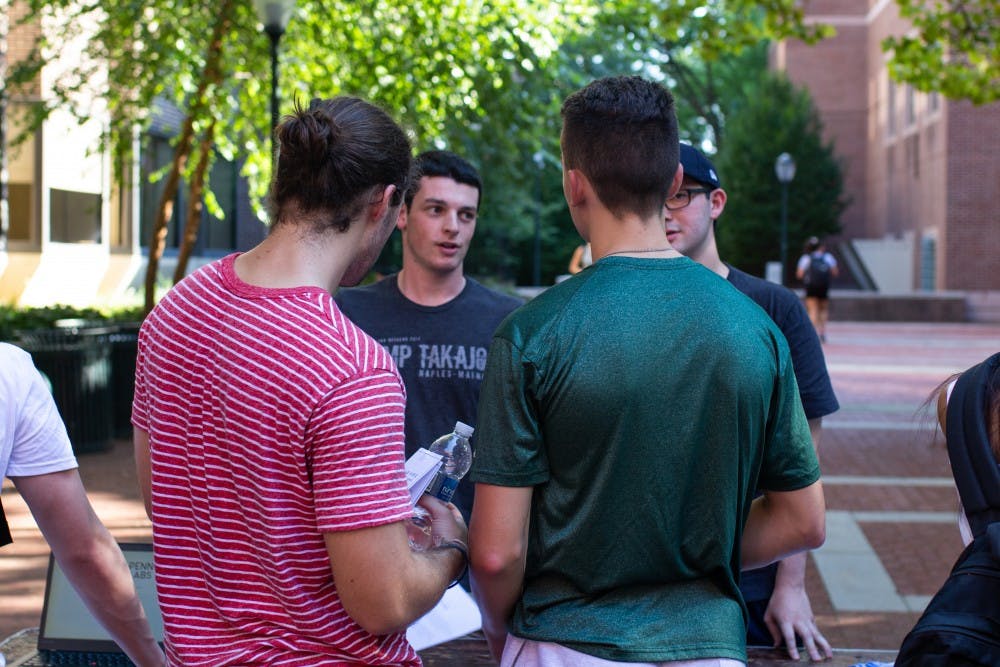This semester, Wharton's notoriously selective finance and consulting clubs made mandatory changes to their application processes to ease the stress that comes with the club recruitment process. Just a few weeks past the club application deadline, freshmen and club leaders have generally expressed positive reactions to the changes, though not all finance and consulting clubs have implemented them.
The new rules, introduced by the Wharton Council, state that Wharton-affiliated clubs must hold at least two group events prior to accepting applications: one General Board Meeting and one New Student Programming event. Applications must also be due no earlier than Sept. 30, about two weeks later than previous deadlines.
College freshman Shreya Naraparaju recently finished the club application process and ended up joining Penn Microfinance. She said she appreciated the extended deadline, as it gave her more time to determine which clubs she was most interested in.
“They had an online application that I filled out, and then, within a couple of weeks, I applied to two committees,” Naraparaju said. “I just had two really, really easy 10-minute interviews, and after that I found out pretty much the day after, whether or not I got in.”
President of Penn Microfinance and Wharton junior Divya Rajagopal said for the most part, the policy changes have increased the quality of her club’s applicant pool, as students have more time to decide which specific club suits their interests.
"I think having these kinds of events and being able to talk to the leaders of these clubs in a more informal setting is really beneficial to the freshmen,” said Rajagopal. “We actually got a lot of great responses from freshmen that [the New Student Programming Event] was informational, even if they didn't end up joining the club.”
She also mentioned that her club is a few weeks behind in scheduling events due to the later application deadline, but added that this was only a fairly minor inconvenience.
Wharton juniors Tom Yuz and Max Bai, chairman of the Wharton Hedge Fund Club and co-president of the Wharton Investment & Trading Group, respectively, agreed with Rajagopal. “We are always happy to take passionate students and sometimes passion takes more than a week to find,” Yuz said.
RELATED:
The Wharton Council doubles down on efforts to reform club recruitment
The students behind Gender Balance Consulting Club want to examine Penn groups’ gender ratios
The changes to the recruitment process, however, do not apply to all consulting and finance clubs. Those that are not affiliated with Wharton do not have to abide by the new policy changes imposed by the Wharton Council.

Naraparaju said she has been able to see how the application process differed between Wharton-affiliated and unaffiliated consulting clubs, and found the latter to be more overwhelming. She applied for 180 Degrees Consulting, whose deadline for written applications was midnight on Sept. 7 — more than three weeks before the Wharton Council-mandated deadline.
In 2016, the club accepted 17 people out of the 200 applicants. That is a 8.5 percent acceptance rate, which is comparable to Penn's lowest-ever acceptance rate of 8.4 percent.
Wharton junior and President of 180 Degrees Consulting Linda Ashmead said the reason the application deadline is early in September is so that the club can complete its semester-long goals on time.
“We fully understand that this may be confusing for freshmen who are unacquainted with the club recruitment process at Penn,” said Ashmead, who added that the club has taken several measures to make the recruitment process more accessible to underclassmen, including dropping the resume portion of the application for freshmen.
Ashmead said the club also held an information session and an interview tip session prior to the application deadline, as well as giving applicants post-interview feedback.
Engineering junior and member of the consulting club The MindBank, Edmund Hammond, wrote in an email statement to The Daily Pennsylvanian that while his club does not feel compelled to follow Wharton’s new rules, members recognize the problems around club recruitment.
“We’re always incorporating feedback, and we do a number of things to keep our process as accessible as possible,” Hammond wrote. “Specifically, we don’t have a written application which helps reduce the time burden, and we also make our interviews more of a two-way conversation, using the time both to get to know the candidate more as a person, and to give them more information about us.”
While the Wharton Council has not yet received formal feedback on the enacted changes, Wharton senior and member of the council Chakravarty Sanjit said they plan to spend the rest of the year collecting and analyzing data on the effectiveness of the new rules.









